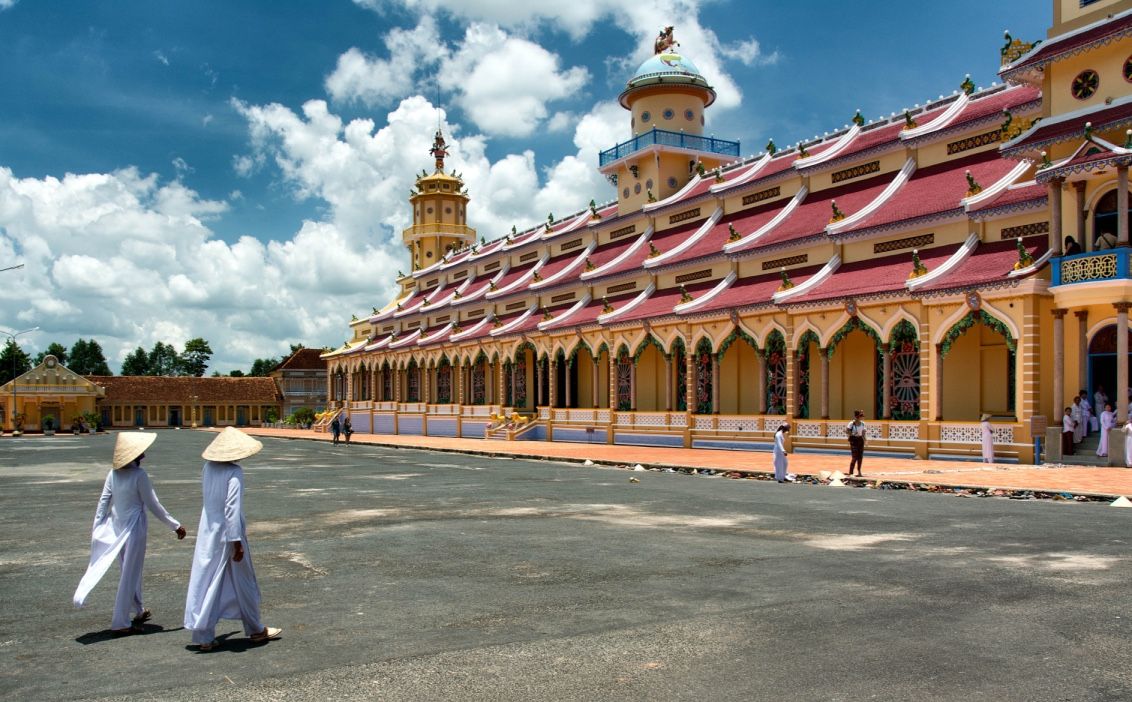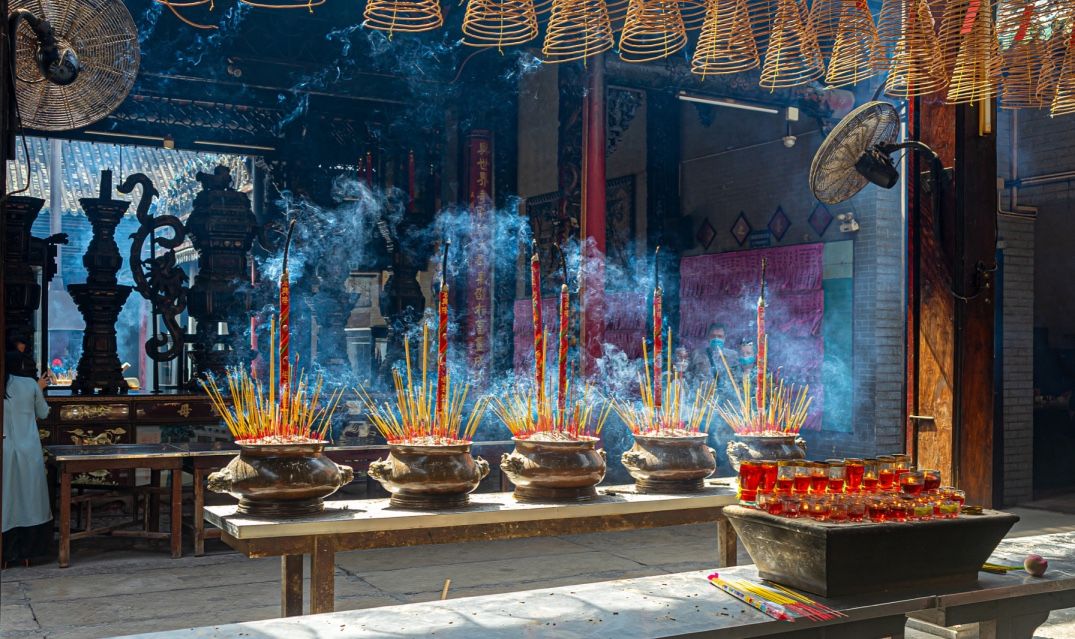Overview Of Religions in Vietnam
Buddhism is the principal religion in Vietnam but there are also sizeable Taoist, Confucian, Hoa Hao, Caodaists, Muslim and Christian minorities
Four great philosophies and religions have shaped the spiritual life of the Vietnamese people: Confucianism, Taoism, Buddhism and Christianity. Over the centuries, Confucianism, Taoism, and Buddhism have blended with popular Chinese beliefs and ancient Vietnamese animism to create what is known as Tam Giao (or “Triple Religion”).
In addition to the state religion of Vietnam – Other popular artistic forms include: traditional painting produced on frame-mounted silk; an eclectic array of theatre, puppetry, music and dance; religious sculpture; and lacquerware.
Immerse yourself in the best experiences Vietnam has to offer with our carefully designed trip that caters to the needs of most discerning travelers, check out Best Tours in Vietnam

What are the major religions in Vietnam?
Vietnamese are free to choose and accept any spirits, beliefs and religion they are happy with. Even though the majority of population in Vietnam marked as non-believer, and or believing on beliefs and practices, to which, this plays a significant role in Vietnamese religion life.
1. Buddhism in Vietnam
Vietnam religion has a long history of localizing Buddhism, giving it a distinct identity. It connects to numerous significant national celebrations and events. The prosperous dynasties of Dinh, Le, Ly, and Tran contributed to the expansion and support of Buddhism, with meditation instructors playing a significant role during their time.
2. Taoism & Confucianism
Taoism & Confucianism complement Buddhism. In Vietnam, the ideas of “Tam giao dong nguyen” (three religions, same origin) and “Tam giao dong quy” (three religions, same aim) emerge from the blending of Buddhism, Taoism, and Confucianism. Together, these three religions shapes human life: Buddhism addresses spiritual and afterlife concerns, Taoism focuses on the physical body, and Confucianism governs society. Additionally, the fusion of Buddhism with other religions led to the creation of Cao Dai.

3. Christianity in Vietnam
3.1. Christian impact on Vietnamese culture
4. Cao Dai Religion in Vietnam
Among all the other religion in Vietnam – the monotheistic Cao Dai religion was founded in southern Vietnam in 1926 dedicated to God rather than any prophet or even Buddha.
Followers of Cao Dai believes in vegetation diet, ancestor worship, nonviolence, and pray to god and they believe that all religions in the world have one main mission and that is living the life and eventually when the time comes, God and humanity will join together like never happened before.
Numerous major world faiths, such as Buddhism, Confucianism, Christianity, Hinduism, Islam, Judaism, Taoism, and the folk Vietnamese religion of Genie, are combined with aspects in Caodaism.
5. Islam in Vietnam
Islam in Vietnam is a fascinating aspect of the country’s diverse religious. The Cham people form the majority of Vietnam’s Muslim community, divided into two distinct groups. The Cham Bani primarily reside in Ninh Thuan and Binh Thuan, while the Cham Islam communities are based in Chau Doc, Ho Chi Minh City, Tay Ninh, and Dong Nai.
Over 80,000 Muslims actively practice their faith in Vietnam, gathering at 89 mosques and prayer spaces. The government officially recognizes seven Islamic organizations, reflecting the importance of Islam as part of Vietnam’s cultural and religious heritage.”
6. Hoa Hao
The Hoa Hao religion, a reformed Buddhist sect, originated in 1939 in An Giang province under the leadership of Huynh Phu So. This unique Vietnamese faith encourages laypeople to practice Buddhism at home, emphasizing simplicity and devotion. Around 1.3 million people actively follow Hoa Hao Buddhism, gathering at 94 temples across 20 provinces. Devotees set up home altars using plain brown cloth, flowers, fresh water, and incense for prayers. The Hoa Hao Buddhist Church serves as the official organization representing this significant religious community in Vietnam.”
Traditional folk beliefs in Vietnam
Vietnamese folk religion worshipped a wide variety of gods from ancient times, especially those associated with agriculture, such as the sun, moon, land, mountains, rivers, and woods, since Vietnamese believe that everything has a soul.
Worshiping the Village Deity
Tolerance is a top feature of Vietnamese religious attitudes. Vietnam has never seen religious extremism or conflict over a religion. Comprehending religion in Vietnam is essential to appreciating many facets of Vietnamese society since religious convictions impact nearly every idea and behavior, influencing how others view us and our behavior.
Vietnam religion percentage 2025
- Folk religions: %73.52
- Buddhism % 14.91
- Christianity % 8.44
- Caodaism (Taoism & Confucianism) % 1.2
Religious Events & festivals in Vietnam
Special religious pray are held at Vietnamese and Chinese pagodas on days when the moon is either full or the merest sliver. Many Buddhists eat only vegetarian food on these days. Some of the major religious festivals follow a lunar calendar.
- Tet (late Jan-early Feb), the most important festival of the year, marking the new lunar year as well as the advent of spring.
- Wandering Souls Day (August), the second-largest festival of the year, when offerings of food and gifts are given to the wandering souls of the forgotten dead.
- Holiday of the Dead (April), which commemorates deceased relatives
FAQ: Religions in Vietnam
What is Buddhism like in Vietnam?
First of all, Buddhist beliefs align with tradition. For example, sculptures of gods in Vietnam have been adapted to Buddhism and crafted according to Buddha statue standards. The pagoda, once used solely for Buddha worship, now features a “pre-Buddha, post-God” or “pre-Buddha, post-Mother” design. In the pagoda, the Vietnamese worship gods, saints, Mother, the local goddess, and the national hero.
Second, Vietnamese Buddhism promotes harmony. In the north, a pagoda features Buddha, bodhisattvas, and arhats from various sects. In the south, a small statue of Sakyamuni Buddha stands beside two other statues: one in blue and one in gold, next to a statue in brown attire.
Is Vietnam a matriarchal society?
No. Vietnam is not a matriarchal society, despite some historical and cultural elements that suggest influence of female. While there are aspects of matrifocal tendencies in Vietnamese households, the overall societal structure remains patriarchal, with men dominating key positions in government, business, and religious institutions.
What to wear in pagoda in Vietnam?
What are the major religions of Vietnam?
Buddhism leads as the predominant religion in Vietnam, with 50% of the population identifying as Buddhist. Confucianism and Taoism reflect deep Chinese influences in Vietnamese culture. Portuguese missionaries arrived in Vietnam in the sixteenth century, and today, Catholics make up about 7% of the population.
Is Vietnam a Muslinm friendly country?
Vietnam offers a wide range of experiences, making it an excellent choice for Muslims seeking a friendly travel destination in Asia. Similar to Hinduism, Islam in Vietnam is primarily practiced by the Cham ethnic group. The Muslim community also includes individuals with mixed ethnic backgrounds living in the southwestern Mekong Delta region, particularly in southern Vietnam. These individuals are often referred to as Cham or Cham Muslims, reflecting their strong cultural and religious identity. Check out Halal foods in Saigon
What is the fastest growing religion in Vietnam?
Protestants, sometimes referred to as “đạo Tin Lành” locally, comprised approximately 1% of the Vietnamese population as of 2022. Protestantism, though still a minority religion, is expanding at the fastest growing religion in Vietnam, having grown by an astounding 600% in the first few years of the new millennium.
Are most Vietnamese atheist?
Is Christianity legal in Vietnam?
Yes, it is legal and followers can practice it with freedom. The constitution guarantees the right to freedom of belief and religion for all individuals in Vietnam, including the right to follow no religion. It also recognizes the freedom of religion or belief for those whose rights are restricted, such as inmates, foreigners, and stateless persons. This legal framework supports various religions, including Christianity in Vietnam, while also accommodating those with no religious affiliation.
Is religion restricted in Vietnam?
The Vietnamese Constitution, which protects everyone’s freedom of belief and religion, is highlighted in the report. However, for reasons pertaining to social cohesion and national security, the Law on Belief and Religion contains ambiguous clauses that may restricted religious freedom in Vietnam.




